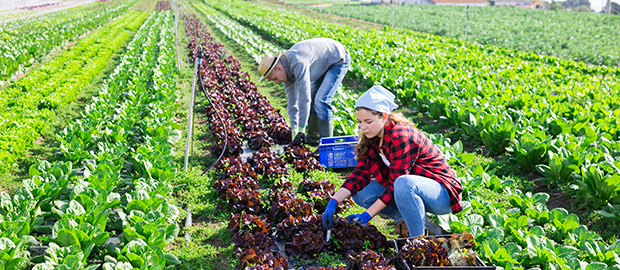Your weekly digest of policy news, funding competitions, and calls for evidence.
What’s been in the news?
Policy makers invest in sustainable agriculture
The Food and Agricultural Organisation of the United Nations (FAO) is expanding the world’s largest agricultural database, FAOSTAT. The FAO said that ‘an important new domain enables much easier comparison and assessment of trends over time of the agricultural structures of all Member countries.’
The new domain allows rapid access to information on how many farms exist in a given country, the size of each farm, its ownership, the farmer’s gender and how many people live and work on them, all sourced to national Agricultural Censuses. The FAO added that prior to the rollout of the new open access tool; work was done to calculate the role that smallholders played in feeding the world. The FAO added that as the new domain is further populated with information ‘more granular and policy-relevant analyses will be easier to conduct, both by the FAO and governments and researchers in Member countries.’
US Government sets out to decarbonise its laboratories
The US Department of Energy (DoE) is to provide $38 million in funding to four of its National Laboratories so that they can take steps to decarbonise. This move is in support of the US Administration’s plan to reach net-zero no later than 2050.
The DoE said that the so-called Net Zero Labs (NZL) Pilot Initiative will lay the foundation for one of the first-ever models for addressing hard-to-decarbonise industries. In addition, it is expected to be a foundation of net-zero solutions that can be replicated at other DoE facilities and all levels of government. By 2023, funding will be made available, on a competitive basis, to all 17 of the US’ National Laboratories.
The four laboratories participating in this initial pilot are: National Energy Technology Laboratory, which is working to advance carbon removal technologies and will incentivise carbon-free electricity production within its three geographic regions. National Renewable Energy Laboratory is working to lower the cost of and increase the scale of technologies to make, store, move and use hydrogen across multiple energy sectors. Idaho National Laboratory is conducting advanced nuclear research to develop and integrate micro-reactors and small modular reactors into micro-grids with other renewable energies to produce hydrogen, and increase energy storage. Finally, Pacific Northwest National Laboratory is developing methodology, algorithms and software platforms that will boost clean energy adoption. These four laboratories are taking steps to harness and produce technology at their facilities to drive down their own carbon emissions.
UK and Sweden cooperate on life sciences
The UK and Sweden have signed a Memorandum of Understanding (MoU) committing the countries to ongoing cooperation in the life sciences. The partners said that the purpose of the MoU is to promote cooperation across local, regional and national healthcare, research and innovation systems in support of life sciences. The areas of cooperation include antimicrobial resistance, sustainability in the life sciences sector, manufacturing processes, implementation of innovation, and genomics.
In the area of antimicrobial resistance, where the partners say they are recognised as international leaders in driving efforts to address the ‘silent pandemic,’ the countries will work together on research and development for novel antimicrobial treatments, preventatives and diagnostics, and share best practice to ensure access and responsible stewardship. The countries will also work together to encourage sustainable antimicrobial supply chains, supporting measures to tackle environmental drivers on antimicrobial resistance.

UK-EU trading relationship
The International Trade Committee has launched an inquiry into the UK-EU trading relationship and is seeking views on issues relating to trading arrangements such as the impact on businesses and other stakeholders.
Deadline: open for submissions
UK trade negotiations
Submissions are welcomed on UK trade negotiations with the EU including views on the objectives of the Department for International Trade for Free Trade Agreement negotiations.
Deadline: Open for submissions
The financial sector and the UK’s net zero transition
The Environmental Audit Committee is examining the role of financial institutions, including UK signatories to the Glasgow Financial Alliance for Net Zero (GFANZ). The GFANZ is aligned with applications to join the UN Race to Zero.
Further information can be found on the UK Parliament website.
Horizon Europe
To find more on eligibility for Horizon Europe funding for your sector, you can view the national contact points on the Government website as well as search for the European Funding and Tenders. Further information on the UK’s association to Horizon Europe is available in the UK participation in Horizon Europe document.
Further information on the SME and start-up fund can be found on the European Commission website.
Canada-UK Net Zero Value Chains – Transportation
UK registered businesses and Canadian SMEs can apply to collaborate on joint R&D projects that contribute to net zero goals. Projects must start by 1 January 2023 and last between 12 and 24 months. A total of up to £4 million will be invested.
Deadline: 29 June 2022
Net Zero Hydrogen Fund – Strand 2 – Capital expenditure (CAPEX)
Strand 2 of the Net Zero Hydrogen Fund will provide CAPEX support for new projects that focus on low carbon hydrogen production facilities to begin deployment in early 2020s. Projects must have a grant request of between £200,000 and £30 million and begin by 1 January 2023, lasting between 6 and 27 months.
Deadline: 6 July 2022
Farming Innovation Programme – research starter pilot - EoI Round 2
Farming, growing or forestry businesses based in England can apply for a share of up to £1 million for feasibility projects. This is an expression of interest competition. Projects must have total costs between £28,000 and £56,000 and last up to 12 months.
Deadline: 6 July
Faraday Battery Challenge Round 5 Innovation: Feasibility Studies
UK registered businesses can apply for a share of up to £25 million across two strands, for innovation in propulsion battery technologies for electric vehicles. Total costs must be between £100 000 and £750,000 and last up to 12 months.
Deadline: 17 August 2022
Horizon Europe Guarantee
This funding is to deliver the UK government’s Horizon Europe guarantee, open to UK-based organisations successful in the first and second wave of Horizon Europe grant
Deadline: No submission deadline.
You can find further details of the funding calls on the Government website.



